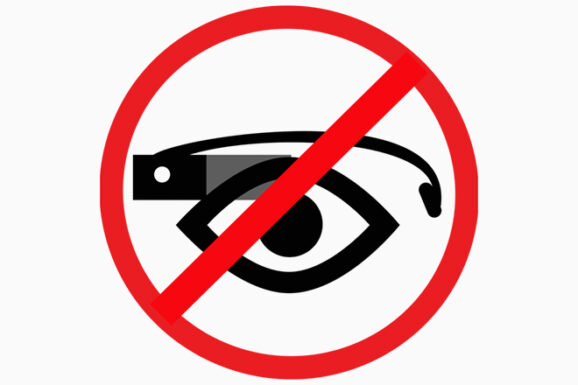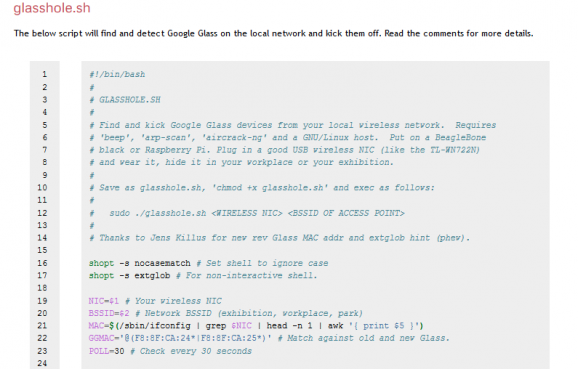Thwart Glassholes With This Wi-Fi Disrupting Program
This article is more than 2 years old
 The Google Glass-capades continue. After the recent assaults on Glass wearers in San Francisco, as well as bars banning the device and people being (understandably) ticketed for wearing it while driving, it was only a matter of time before someone came up with a way to remotely disable the device.
The Google Glass-capades continue. After the recent assaults on Glass wearers in San Francisco, as well as bars banning the device and people being (understandably) ticketed for wearing it while driving, it was only a matter of time before someone came up with a way to remotely disable the device.
Julian Oliver, an artist born in New Zealand, now based in Berlin, creates art, holds workshops, and teaches classes that include creative hacking, augmented reality, video game development, and more. His time in Berlin has made him especially sensitive to Google’s privacy invasions, particularly regarding Streetview. He sees Glass as the latest iteration of these infringements. On his website, where he first posted about “glasshole.sh,” he quotes from the Cypherpunk Manifesto, a doctrine that the NSA has essentially wiped their asses with: “Privacy is the power to selectively reveal oneself to the world.”
Oliver undoubtedly has been following the stories about Glass, but responded specifically to an NYU Media Research Lab “creative technologist” who was disgruntled when audience members attending NYU’s Interactive Telecommunications Program exhibitions wore Glass because he couldn’t tell if they were recording the presentation and/or streaming it online. Oliver then designed the Glasshole.sh script that allows people to “Find and kick Google Glass devices from your local wireless network.”
 The program works by identifying attempts by Glass devices to connect to Wi-Fi networks. Apparently, there’s a character string specific to the device—in MAC addresses, anyway. Oliver’s program can be installed on a Raspberry Pi or mini-computer, and when it’s plugged into a USB network antenna, the program becomes a dog with a nose keen to the scent of Glass. When it finds one nearby, it impersonates the network using Aircrack-NG, which then issues a “deauthorization” command that kills the connection. It can also alert others nearby to the presence of a Glasshole by beeping.
The program works by identifying attempts by Glass devices to connect to Wi-Fi networks. Apparently, there’s a character string specific to the device—in MAC addresses, anyway. Oliver’s program can be installed on a Raspberry Pi or mini-computer, and when it’s plugged into a USB network antenna, the program becomes a dog with a nose keen to the scent of Glass. When it finds one nearby, it impersonates the network using Aircrack-NG, which then issues a “deauthorization” command that kills the connection. It can also alert others nearby to the presence of a Glasshole by beeping.
Places that ban Glass could use the program to enforce that ban. The program will likely have to be tinkered with in the future, especially as MAC addresses change, but Oliver insists that the program is legal, much like jamming cell phones—as long as the person using Glasshole.sh owns the network. Still, he has plans for making an even more rabid version of the program that kicks Glassholes off any or all nearby networks, or that cuts the connection between Glass and a user’s phone, which he admits is a “you can all go to hell” statement versus a territorial one.












